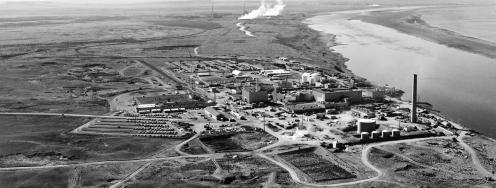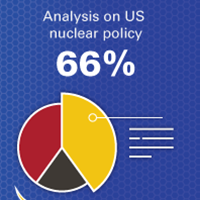A Step Back for Nuclear Security
According to a recent interview, the number one worry that keeps the President up at night is "loose nukes." Speaking at the Nuclear Security Summit in March, President Obama expounded on the idea that loose nukes pose the biggest threat to our security: Russia, he says isn’t “the number-one national security threat to the United States. I continue to be much more concerned … with the prospect of a nuclear weapon going off in Manhattan.”
For all of the President’s rhetoric about needing to address the threat of loose fissile material and nuclear terrorism, his budget tells a different story. The National Nuclear Security Administration’s (NNSA) Fiscal Year (FY) 2015 budget request cuts funding for core nuclear and radiological material security programs by nearly 18%. These programs form the basis for the United States’ efforts to secure vulnerable nuclear materials around the world, and to keep these materials from falling into the hands of terrorists.
At the same time, funding to maintain or rebuild nuclear weapons and related programs received a nearly 7% increase. This increase means that nuclear weapons are being funded at the expense of programs that prevent their spread. If securing loose fissile material is, in fact, a bigger national security threat than a newly belligerent Russia, it stands to reason that nuclear security programs should be made a higher priority than the nuclear arsenal, which is in large part intended to deter Russia.
What’s more, the fact that nuclear weapons programs are seeing increases in their budgets suggests that the administration cannot reasonably justify its budget by pointing to the tough fiscal environment.
As Senator Dianne Feinstein put it, “Secretary [of Energy Ernest] Moniz told me that national security funding was constrained and he had to make hard choices. And yet, NNSA was able to find an additional $534 million for nuclear weapons.”
The Obama administration’s budgetary priorities are especially concerning given that a program facing very deep cuts is the same program that removed nuclear material from Ukraine after the fall of the Soviet Union. The Global Threat Reduction Initiative (GTRI), which saw its funding cut by a whopping 25% in Obama’s FY2015 budget, converts, removes and protects nuclear and materials around the world. It was only a little over two years ago that GTRI facilitated the removal of the last of Ukraine’s highly enriched uranium. These efforts prove that U.S.-led nuclear security efforts remain crucial to international security.
If not for programs like GTRI, the already-unstable crisis in Ukraine could surely be even more dangerous.
This month, members of the Fissile Materials Working Group (including Council for a Livable World, my organization) are circulating a petition to the White House urging President Obama to reverse these dangerous cuts.
In the President’s defense, he’s done a lot to raise international awareness about the threat of nuclear terrorism. Most notably, he initiated the Nuclear Security Summit process, which since 2010 has convened world leaders every two years to coordinate international efforts to prevent nuclear terrorism.
But actions speak louder than words – and budgets speak even louder. Despite President Obama’s laudable efforts, there is much more that can and should be done to address this key national security issue. As the case of Ukraine illustrates, the threat of unsecured fissile material is neither antiquated nor remote. And the President’s budget suggests that the administration isn’t assigning nuclear security the importance it deserves.
If the threat of loose nukes keeps President Obama up at night, then he should also be losing sleep over the dangerous cuts made in his own budget.
Usha Sahay is the Director of Digital Outreach at Council for a Livable World and the Center for Arms Control and Non-Proliferation. Please note that the opinions expressed in this article are attributed to the author and do not necessarily reflect the position of Ploughshares Fund.




